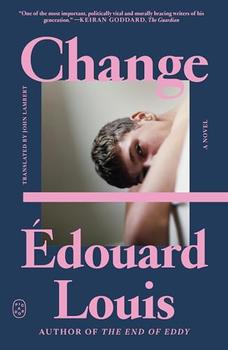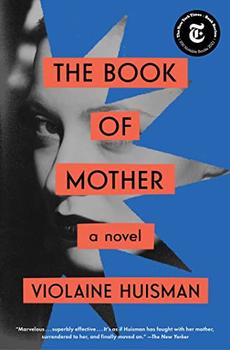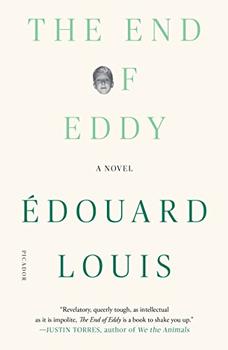Summary | Excerpt | Reviews | Beyond the book | Read-Alikes | Genres & Themes | Author Bio

A Novel
by Edouard LouisÉdouard Louis's 2014 debut novel, The End of Eddy—an instant literary success, published when Louis was just twenty-one—follows the life of a gay youth in a small, poor factory town in northern France. Based on Louis's own life, the novel details the cruelty hurled at Eddy—by his neighbors, peers, and especially his own family—for his homosexuality: slurs, beatings, taunts, gossip. But while Eddy's bullies and family are no sympathetic figures, the novel is as much about the systematic oppression that Eddy's village faces as it is about their homophobia. The novel is full of bracing anecdotes of the indignities of poverty: Eddy's family bathing in the same tub to save water; Eddy begging the grocer to extend their credit so they could eat dinner; Eddy's father breaking his back at his factory job and losing the family's sole source of income. The cruelty, alcoholism, and physical violence of this world is a result of its denizens' circumstances, if not excused by them: violence begets violence (see Beyond the Book).
While reading The End of Eddy, we know how it ends, because of its author's biography: Eddy will escape the small town in which he was never accepted, attend the École Normale Supérieure in Paris, change his name from Eddy Bellegueule to Édouard Louis, and become a celebrated writer at age twenty-one. In fact, the novel doesn't make it that far—it closes with Eddy's acceptance into a performing high school in the nearby city of Amiens, the first step in his escape. "I was already far away; I had already left their world behind," he says upon receiving his acceptance letter.
Change, Louis's latest novel, picks up where The End of Eddy leaves off and finishes the story, detailing the difficult, intensely intentional process by which Louis's autofictional alter ego transforms himself from Eddy to Édouard and attempts to do what his younger self thought he'd already done—leave his old world behind. In Amiens, Eddy realizes that the values and mores of his hated village are not universal and can be rejected. But he can't quite fit in with his middle-class peers. Enter Elena—a wealthy, bourgeois student whom Eddy admires from afar, then befriends, then begins to emulate. The first part of Change is titled after her, and is addressed to Eddy's father: "When I met Elena I became attached to a new way of life, to the codes of a new social class… because all of that allowed me to take revenge on my childhood, to give me power over you, over my past, over poverty, over the insults, and in imitating this life I was gaining access to a world that had always intimidated you."
The beginning of his transformation with (or into) Elena is exciting and shameful and painful. He changes his accent; she helps him dress better and eat properly with a fork and knife. After learning of the dangers of smoking around children, Eddy returns to his home full of righteous anger and starts a fight with his mother: "I shouted that she was a bad mother, unable to raise children… Because of you I'm going to fucking die, I said, you made me breathe in your smoke for my whole childhood, do you have any idea what you did to me, you ruined me." They trade blows until she hits him, both of them yelling and crying. "After that clash I realized I couldn't go back to the village on weekends," he writes. "I'd become someone else."
The Eddy of Change is motivated solely by his desire to avenge his past—to show everyone who bullied him and underestimated him and trapped him that he is better than they are. It is only a matter of time, then, before this almost pathological desire leads him to abandon his life in Amiens for something greater. After a few years, he meets Parisian intellectuals and decides he wants to be like them instead—Elena, who once seemed so cosmopolitan and rarified, now seems provincial in comparison. More importantly, Amiens is too close to home, and "being in Amiens meant remaining a prisoner of my childhood." In the same way he became bourgeois by imitating Elena, he decides to become an intellectual by imitating his new friends—reading books, doing scholarship, writing his own work. "If I really wanted to avenge the child I'd been, like Didier I had to go to Paris and do what he'd done," he reasons. "Hadn't I promised myself that one day I'd be famous and important, hadn't I wanted the boys at school to see what I'd become and pay for what they'd done to me, to regret their acts and suffer from the gap between their lives and mine?" His new intellectualism also coincides with accepting his homosexuality and officially coming out—his Parisian friends are gay, and Édouard sees in them a viable and exciting lifestyle.
Édouard the narrator sees everything he does as a definitive break, a border crossing between his past and his future. When he has sex with a man for the first time, he thinks, "I've crossed a line." When he's accepted to the École Normale, he thinks, "I'm saved." When a wealthy Parisian gives him his phone number for a date, he thinks, "I've made it." As a refrain, it's almost comical—to see the young Édouard say to himself, every few pages, "Okay, now I really can't go back," only to find himself still caught up in his past—although the comic can easily turn tragic, as in one scene in Paris in which Édouard, low on money, has to scrub the floors of rich people's mansions: how far has he really come? As he fraternizes with the uber-wealthy, and feels disgust at their lifestyle, he comes to desire revenge not only against the people of his past, but also against the entire system of power and wealth that oppressed them. What does he want, deep down, he wonders, as he considers his social ascent. "Did I want to become bourgeois? to get rich? to become an intellectual? to be famous? to be rid of the threat of poverty for good?" He finally writes his first novel, but it is, of course, not the escape he thinks it will be.
Change is more straightforward than The End of Eddy, and perhaps a less impressive feat. In Louis's previous works, other people, especially Eddy's family, are allowed to be deep, complex characters—victims as well as villains. In Change, by contrast, everyone conforms to Édouard's relatively linear narrative; if people are presented as complex, it is not because they are shown acting in interesting ways but because Édouard explicitly analyzes the conflicting forces acting on or through them. Elements of Louis's previous works that seemed to me more traditional—characters with ambiguous motivations and feelings; tension about what will happen next (even as we know how the story will end eventually); room for surprise—are missing. This is perhaps especially true for the character of Édouard himself, who is presumably a charismatic guy—Everyone loves him! People pay for his rent and dental surgeries and international flights! Total physical and intellectual transformations aren't cheap—but appears charmless and monomaniacal on the page.
And yet I loved Change and its monomaniacal narrator: his rigorous honesty, his physical inability to lie to himself about what he wants or what he will accept; the way he honors his life by working hard for his future self. His story is familiar, even if his circumstances are extreme. Feeling shame and spite at our past selves; the way excitement at the future turns the present into the living past and the future into the present; the desire to escape our past and start over completely, to live without ennui, to think "this is not enough for me" and move on, no matter how painful—these are universal experiences and desires, rendered on the page with seriousness and intelligence, in a story that is, like the stories of many great writers, equally aspirational and depressing.
![]() This review was originally published in The BookBrowse Review in April 2024, and has been updated for the
June 2025 edition.
Click here to go to this issue.
This review was originally published in The BookBrowse Review in April 2024, and has been updated for the
June 2025 edition.
Click here to go to this issue.

If you liked Change, try these:

by Violaine Huisman
Published 2022
A gorgeous, critically acclaimed debut novel about a young woman coming of age with a dazzling yet damaged mother who lived and loved in extremes.

by Edouard Louis
Published 2018
An autobiographical novel about growing up gay in a working-class town in Picardy.
Your guide toexceptional books
BookBrowse seeks out and recommends the best in contemporary fiction and nonfiction—books that not only engage and entertain but also deepen our understanding of ourselves and the world around us.